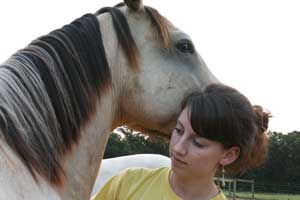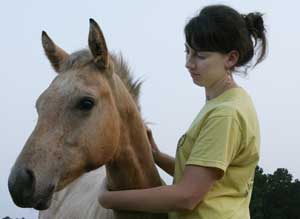The sun rises over a quiet city. Megan Mueller’s alarm beeps, signaling her to wake, while others are still in their cozy beds, with more sleep left in the night. In the field, the horses graze, the birds chirp and the breeze rustles the wet grass.
Every morning at 5:30 a.m., Mueller, a junior in animal science, heads out to the field with her roommates to give the horses water and food. She works on an equine unit, where she spends ten hours a week taking care of the horses.
“I get to see the sunrise, which is something most college students don’t get to see,” Mueller said. “There isn’t anything better than waking up at 5:30 and seeing a field of horses and foals.”
Mueller has adjusted her schedule in order to go to bed earlier. She said she aims to be in bed by 11:00 p.m., but this varies depending on her amount of homework.
“I have to function on a little less sleep,” she said. “It keeps me busy.”
Mueller enjoys her job and finds it “rewarding.” She started working for the Equine Educational Unit in June as a volunteer. When she started, Mueller didn’t know much about horses but said she wanted the experience.
“I love animals,” Mueller said repeatedly.
Mueller lives at the unit. As long as she works ten hours a week, she has free housing. Mueller feels it is “a really good deal.” Any hours she works over the required ten, the Unit pays her, “but that doesn’t occur too often.”
The housing is “like a dorm room” according to Mueller. There is a bunk bed and a bathroom connected to the room. The furniture and kitchen appliances are provided. She shares a common kitchen with the other people who live and work there.
Not all workers at the unit live there, though. There are volunteer and paid positions. However, everyone who works there are students, and most, according to Mueller, are animal science or biology majors.
Mueller gives food, water and treatment to the horses. If a horse needs a dietary supplement due to specific needs, Mueller makes sure the medicine is administered. The horses do not always feel “up to par.” This is something that happens to all animals, Mueller said. If a horse is not completely healthy, she makes sure it is taken care of until it is back to full strength.
In the spring, Mueller will participate in the breeding program which collects stallion sperm and artificially inseminates the horses using a horse phantom.
According to Mike Yoder, extension horse specialist, a horse phantom is “a tool mounted in the ground that is approximately the same height, length and width of a horse.”
The unit trains the stallion to mount the phantom like it would a mare, according to Yoder. A person holds an artificial vagina (AV) for the stallion to ejaculate into.
“[This method] is safer because you don’t run the risk of the mare kicking the stallion,” Yoder said.
After the mares have been artificially inseminated with the stallion sperm, Mueller will participate in “foal watch” with her co-workers.
During foal watch, they take shifts staying up all night with the horses waiting to help a pregnant mare give birth. Mueller is looking forward to the spring, when she gets to witness mares giving birth and participate in the breeding process.
“It’s a once in a lifetime opportunity,” she said. “I will lose a few hours of sleep to gain experience.”
Mueller said she enjoys the sights on the farm. She can see the foal barn from her window and when it’s stormy, the foals press their noses against her window.
Horses are not Mueller’s passion, though. Mueller said her dedication is to animals in general, focusing mainly on domestic animals, but her dream is marine wildlife.
To get more practice in her field of choice — domestic animals — she works at Noah’s Ark Veterinary Hospital in Cary where she said she does “a little bit of everything.”
To her, a little bit of everything is just that, including reception, surgery assistance, lab work and helping with the animals boarding at the hospital. She walks the cats and dogs, checks their food, water and litter boxes.
“I like it a lot,” Mueller said. “I’ve worked in veterinary offices before and this is more hands on.”
Noah’s Ark Veterinary Hospital deals mostly with dogs and cats, but a few exotic animals “pop in” from time to time, according to Mueller. An iguana came in “the other day,” but she was not there to see it.
Mueller plans to attend veterinary school and considers opening her own clinic one day. However, one of her dream jobs is “to be a veterinarian for Sea World.” According to Mueller, nothing is set in stone, but for now, she’ll be working on the farm with the horses.









